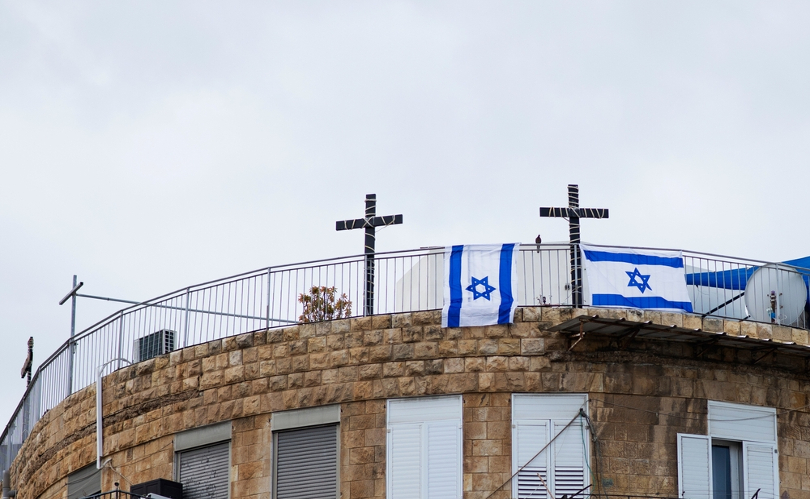After murdering the Sharabi's family dog, terrorists abducted the family and Ofir Engel to Gaza and subjected them to psychological torment.
By JERUSALEM POST STAFF NOVEMBER 22, 2024 19:13 RELEASED HOSTAGE Ofir Engel, 18, appears before the foreign media at a news conference in Kibbutz Be’eri to tell of his ordeal.
(photo credit: YONATAN SINDEL/FLASH90)
RELEASED HOSTAGE Ofir Engel, 18, appears before the foreign media at a news conference in Kibbutz Be’eri to tell of his ordeal.
(photo credit: YONATAN SINDEL/FLASH90)
Released hostage Ofir Engel revealed the mistreatment and abuse Hamas terrorists subjected him and his girlfriend's family to on Oct.7 and and as captives in Gaza in an interview with the Jewish News Syndicate published on Thursday.
The now-19-year-old Engel was abducted from Kibbutz Beeri on Oct.7, where he was observing Simchat Torah with his girlfriend Yuval Sharabi and her family. They were sleeping at 6:30 in the morning when rocket sirens woke them. He was 17 at the time Hamas abducted him.
“But the [sirens] didn’t stop,” Engel told JNS. “After two-and-a-half hours, friends started sending scary messages about hearing terrorists outside their houses and pleading for the army to arrive.”
Slowly realizing the seriousness of the situation, Engel read of the news of the invading terrorists - learning of the ongoing massacre from survivors and witnesses. The terrorists would soon make their way to the Sharabi home.
“After six hours, we heard a large ‘boom’ coming from the entrance to the house. We heard terrorists roaming around inside while we were still all in the safe room,” he recalled. “A few minutes later, they tried opening the door to the room. Yuval’s dad, Yossi, was holding it closed. But he wasn’t able to overcome the three terrorists pushing it open.”
When the terrorists eventually forced their entry into the safe room, Engel said the first thing they did was shoot the family’s dog.
“They entered armed. The first thing they did was shoot Yuval’s dog. They then pointed their guns at us,” he described. “They made us sit outside on the grass with the neighbors, the Shani family. Smoke was everywhere, as was the smell of gunpowder.”
The family was later taken to Gaza where they were held captive.
“They put Yuval’s father inside. Yuval and I were holding hands. At first, they put us both inside, but then they signaled to her to get out. They put Amit Shani, the young son of the neighbor, inside instead, and we drove away, speeding like crazy,” Engel said. “The last image I had of Yuval and all of her family, other than her father, was of them on the side of the road surrounded by two armed terrorists as we drove away. I was sure they either had been kidnapped or were murdered that day.”
After arriving in Gaza, terrorists interrogated them on their background, army service and age, Engel said. Civilians would later be invited to observe and laugh at them.
Stay updated with the latest news!
Subscribe to The Jerusalem Post Newsletter
“One of the terrorists called his friends and family, even his mother, to come observe us. They looked very happy, laughing and smiling. We felt like animals at a zoo,” he said. “At night, they moved us to another house. There, we slept on a couch with eight armed terrorists who kept yelling at us in Arabic. They seemed like they hated us and were ready to shoot us in the head at any second.”
For 26 days, Engel remained hostage in that home - needing to ask permission to go to the bathroom, and not being allowed to stand.
“We slept on mattresses on the floor. They gave us two pieces of bread a day, cheese, canned meat and a quarter of a bottle of water,” he recounted. “They also gave us cards and we played from morning to night. Sometimes, we even played with the terrorists. But we never let them win. We didn’t want to make them feel like they were beating us at anything.”
Engel explained that after 26 days, he and two other hostages were moved to the house of a Hamas commander.
“He was a very mean man. He didn’t let us speak at all. He locked us inside a room and kept telling us we’d die in Gaza,” Engel said.
Around 14 days later, terrorists arrived to record two hostage videos of the three captives. Engel testified that they were instructed to say that Hamas was taking care of them, feeding them, and that Israel should make a deal for their return.
In the second video, Engel and the others were told to say they were only given three dates and half a glass of water - and they could not survive on this.
“We thought it was a good thing. We believed they would release the clips and our families would know that we were alive,” Engel said. “But they never published them.”
A little over a week later, Engel described how terrorists arrived demanding they write goodbye letters to their loved ones, telling them they would die.
“I wrote to Yuval, to my family, to my friends,” Engel said. “I wrote a whole page, maybe even more. It was terrifying because they’d just come and say something like that and you couldn’t know whether it was true. We told ourselves that if they asked us to write the letters, it was probably true. We wrote in fear; went to sleep terrified; and realized the next morning that it wasn’t real—that they’d lied to us again. The fear kept growing and with each passing day, there was less food.”
A few days later, on day 53 of captivity, the three hostages were moved for the third time.
“It was nighttime and dark. We couldn’t see much. Suddenly, in the middle of the street, they separated Sharabi from us and took him away. It was the last time I saw him; we didn’t even get to say goodbye,” Engel said. “In captivity, I felt scared constantly, because at any given moment those terrorists who hated me could have killed me. Yossi [Sharabi] was like a father. He always helped and gave us hope. He kept saying we would make it out. I don’t know what I would have done without him.”
They were taken to a building and told that they would be returning to Israel - but they didn’t believe the terrorists at the time.
After some wait, they were transferred to a vehicle with two women in Islamic garb.
“They took us from there by car with two women dressed in jalabiyas whom we assumed were Arabs. But suddenly, one of them whispered in Hebrew, ‘Do you speak English?’ I was in shock. I didn’t answer. She asked again and I said, ‘yes.’ She explained they were also captives and that we had to be quiet,” he recounted.
The two women were Moran Stella Yanai and Raya Rotem, who are now free from Hamas.
Instead of being taken straight to the Red Cross team, they were taken to a house with more female hostages.
“In that house, there were lots of terrorists, but they were much nicer,” Engel said. “They gave us many pitas, drinks and sweets. They wanted us to go back with good feelings and say we were treated well, but we weren’t.”
“We stayed there until the morning when they moved us to what would be our last location before handing us to the Red Cross. They said the confirmation from Israel would come at 6 p.m. Meanwhile, more hostages arrived, including Itay Regev, Liam Or and Liat Atzili. We welcomed them and gave them food. I knew Liam through Yuval. We looked at each other and asked, ‘What are you doing here?’ The situation was absurd.”
In the hours leading to their release, Engel described how the terrorists continued to inflict psychological torture methods - telling them that Israel didn’t want them back.
“They put all 11 of us in a big van and drove to meet representatives of the Red Cross. They took us out of the van and delivered us in pairs. There must have been 200 armed, masked terrorists around.
“We were then taken to Gaza’s Rafah crossing with Egypt, where we encountered the first Israelis who weren’t hostages, and we finally knew we’d be OK. They took us to Israel’s Kerem Shalom crossing and then to the IDF Hatzerim base.
“I had no idea what had happened to Yuval and her family. I asked one of the soldiers on the bus from Kerem Shalom to Hatzerim if she knew, and she said that they were alive and well. I started crying like a 3-year-old because I’d been sure they were dead.”Engel was reunited with his parents and shortly after his girlfriend.
“Suddenly, I’m coming back. I’m returning home, and I realize she’s alive and I see her. So many life-changing events happened in less than 24 hours. It was crazy,” Engel said.
Hamas announced that Yuval’s father Yossi was dead on day 97. The IDF would later confirm this to the family.
“It was very tragic for me because I was with him for two months,” said Engel. “We were held in the same room. I knew he was OK; I knew he was feeling fine. But time there had an impact. As time passes, hostages die and we don’t want them to return in coffins. We want them alive.”
“Physically, I’m OK,” Engel said. “Emotionally, I can’t do anything for myself because the fact that there are still hostages held in Gaza prevents me from starting to recover. If I were still a hostage, I would want everyone who returns to do everything they could to help me. Traditionally, the IDF knocks on a family’s door to announce that a loved one is gone. This is almost the only opportunity Israel ever had to knock on the doors of those people and say that their loved ones have returned.”
Over a 100 hostages now remain in Hamas captivity. International efforts for a release-ceasefire deal failed to come to fruition after the initial November deal.
Seven living hostages have been rescued by the IDF, and the bodies of others have been recovered. It is believed that 48 hostages have been killed in captivity, according to IDF estimates.

 By The Jerusalem Post (World News) | Created at 2024-11-22 18:50:09 | Updated at 2024-11-29 08:47:34
6 days ago
By The Jerusalem Post (World News) | Created at 2024-11-22 18:50:09 | Updated at 2024-11-29 08:47:34
6 days ago








